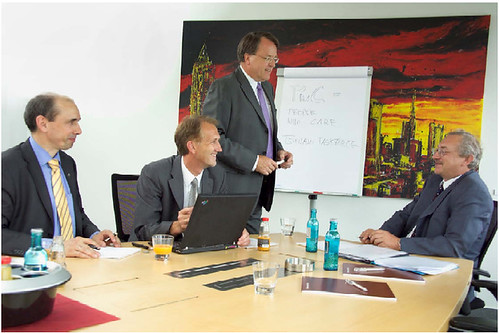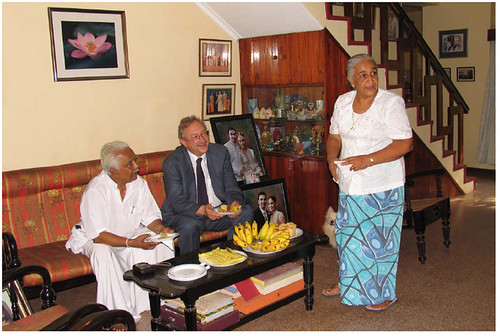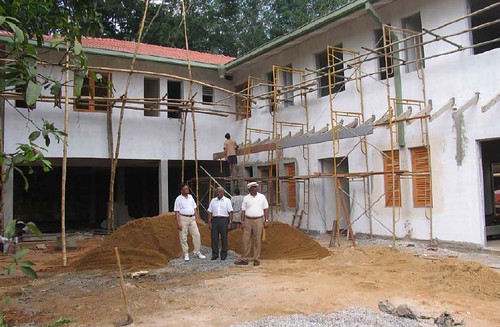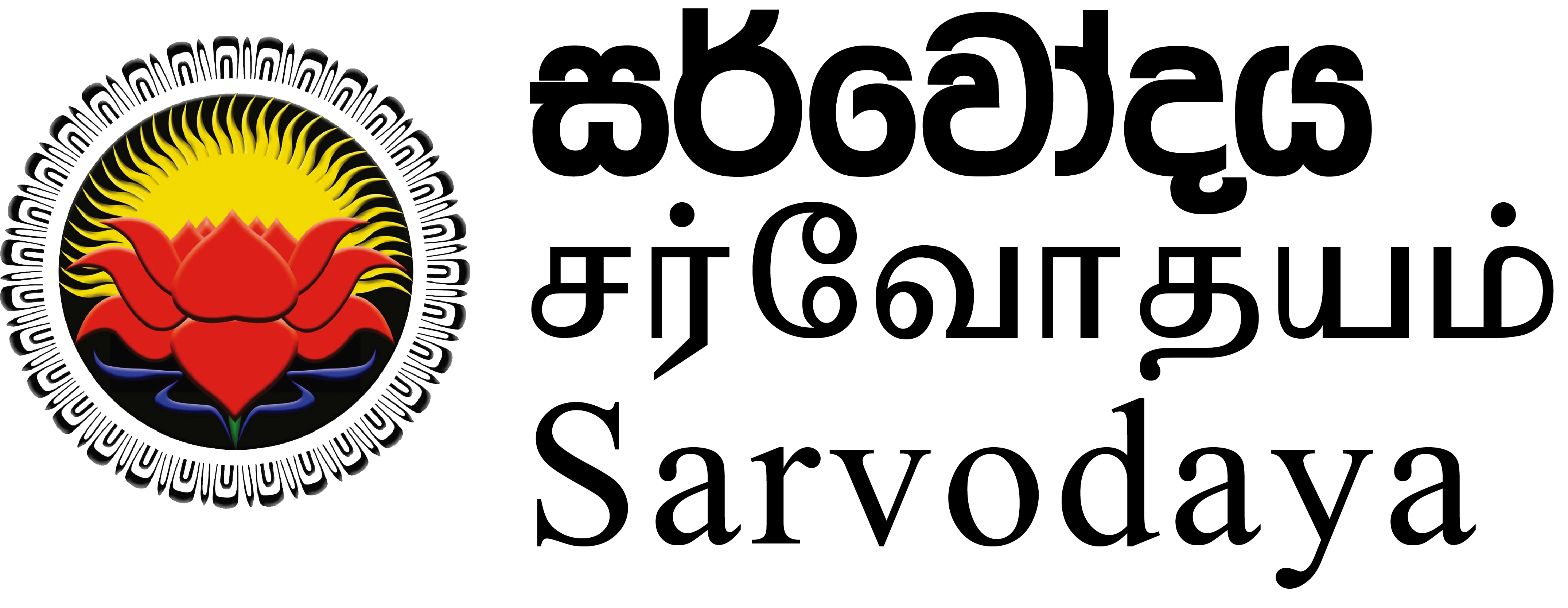PricewaterhouseCoopers (PwC) Germany had the first contact with Sarvodaya in Feb. 2005 in connection with the Tsunami Reconstruction activities in Sri Lanka. After watching the vast devastation caused by this most destructive natural disaster of recent times, Germany’s PwC leader Hans Wagener initiated a fund collection drive immediately and appointed a Task Force to follow up all Tsunami related activities of the German Company. At the same time the Global Company started the “People who Care Initiative” on an international basis.
One million Euros from PwC Germany to help Tsunami rebuilding.
Hans Wagener’s request to his employees to donate parts of their annual leave and overtime showed instant results and individual contributions reached Euro 549,000.00. The German leadership team increased the total fund to one million Euro with its corporate contribution, thus demonstrating the commitment to support from the top level leadership.

PwC Germany Tsunami Task Force at work. Hans Wagener (standing centre) talking to Frank Brebeck (right). Michael Lederer (left) and Peter Hoefling looking. Absentee: Hans-Joachim Pflocksch.
Finding a sustainable project
While the funds were being collected, Hans Wagener contacted PwC firms in Sri Lanka, Indonesia and Thailand and also several non profit organisations including the German Red Cross, SOS Kinderdorf International, HELP and Sarvodaya Sri Lanka. Sri Lanka got special attention as Hans Wagener sent Lynton Pieris (a Sri Lankan born project management consultant attached to PwC Germany) to assess the field situation in Sri Lanka and select a suitable project.
PwC Germany being a leading member of the group of companies, has always given appropriate consideration and a high priority to its CSR activities within the framework established at global level. “PwC-Stiftung” (the German PwC Foundation) spends annually about Euro 800,000.00 for innovative projects contributing to sustainable development of cultural education of children and in special of the socially disadvantaged groups. Based on the CSR Guidelines of the “PwC-Stiftung” and with the vision to go beyond the immediate relief, the Tsunami Task Force decided to work with Sarvodaya Sri Lanka in expanding and upgrading an orphanage for girls located at Kosgama.
According to Sarvodaya Leader Dr. A. T. Ariyaratne who had visited all affected places, there was an urgent need to facilitate the children who were separated from both parents as a consequence of the Tsunami. The UNICEF reported in Jan 2005 that nearly 900 children in Sri Lanka have lost both parents, whilst another 3200 had lost only one parent. Dr Ariyaratne took the challenge to give temporary accommodation to many of these children through Sarvodaya until they could be settled down in permanent care giving homes. Ultimately he decided to expand and upgrade seven of Sarvodaya’s twenty operational sites across the country to fulfil these commitments on a long term basis. Sarvodaya’s unconditional commitment, continuous contribution to help destitute and orphaned children and its international recognition as an accredited care giving organisation, made it quite easy for PwC Germany to decide to work with this organisation.
Project Objectives
The Girls Home at Kosgama was one of the sites, which needed an urgent upgrading and extension, as the prevailing facilities and space were inadequate for the 20 children accommodated there and space was available to expand the facilities to around 35 – 40 children.
The primary objective of this project is to offer adequate and comfortable residential facilities to destitute and orphaned children.
Care for these children with love, affection and security in an environment of protection facilitating the nurturing and development of their lives to become able citizens of the country.
The core values of this program implemented through the children’s homes will be loving-kindness, compassion, unselfish joy and equanimity and these values will at all times guide the operations, the action plans and processes of management of the homes.
Project scope
The prevailing condition of the Kosgama home including its electrical wiring, water supply, toilets and study/recreation facilities and the kitchen/dining facilities were inadequate and did not match the expected standards.
It was decided to upgrade the present building and add a new building to create a purpose built centre that will satisfy not only the regulatory requirements (125 sq. ft. area per child) but also meet the expected standards of best facilities with dormitories, dining halls, a study room, multimedia/ICT centre, a small library, adequate and basic play areas (indoor and outdoor), auditorium for singing/ dancing/drama/ debate, skills and creativity centre, quarters for staff and pleasing surroundings (landscaped garden).
On successful completion of the project this home will comfortably accommodate thirty-five to forty girls in a spacious area of about 10000 square feet (about 1000 square meters) in a pleasant surrounding. The skills centre will support the village women and girls wishing to enhance their skills during the morning hours whilst the children are out at school. Frank Brebeck, a member of the Executive Board of PwC Germany laid the foundation in May 2005 and Sarvodaya expects to reopen the Home in September 2006.
The new home is expected to cost Euro 250,000.00 upon completion including the furniture, kitchen equipment and other accessories and is fully funded by PwC Germany.

Mrs. Ariyaratne (right) entertaining Frank Brebeck (centre), PwC Germany and Sarvodaya Leader Dr. A. T. Ariyaratne (left) with Sri Lankan sweets after signing the MOU for Kosgama Project in May 2005.
Managing the Project
From the very beginning PwC Germany laid emphasis on establishing a systematic approach in delivering the project. PricewaterhouseCoopers, a company working in a “connected thinking” worldwide network, uses best practices in project management which have been established through the collective intellect and expertise of international teams. PwC Germany works closely and continuously with the Sarvodaya project team in monitoring the project and thus sharing the common experience and transferring knowledge where necessary and possible. PwC Germany and Sarvodaya prepared the road map for Project implementation in a joint effort after the selection of the project.
The Project Proposal as it is named:
- defines the agreed scope
- shows the milestones and major stages with deliverables
- gives due consideration to implementation risks
- allocates the tasks and responsibilities for all persons involved in the project
- shows a transparent breakdown of the anticipated project costs
- defines the rules for communication and reporting during the project implementation

Sri Lankan PwC Leader Deva Rodrigo (centre), Sarvodaya volunteer project manager Chandra Jayaratne (right) and project coordinator PwC Germany Lynton Pieris inspecting construction work in April 2006.
Sarvodaya Project Manager and the Project Coordinator of PwC Germany track the physical progress of the project on a weekly basis. The project Status Report forwarded once a month to the PwC Tsunami Task Force summarises the following information:
- physical progress against agreed targets
- expenditure against budget
- realisation of objectives at milestone level against agreed parameters
- issues arising from risk and uncertainty
- issues requiring attention at top management level
This process is supported by a computerised reporting tool based on Microsoft Excel, a viable project schedule based on Microsoft Project and a monthly cash flow report (Excel) produced by Sarvodaya Finance Department.
On completion of the project PwC Germany will assign an audit partner to review the project implementation and verify, if Sarvodaya has given due consideration to principles of good governance, accountability and transparency during the execution of the project. The findings will be documented in a report together with the “lessons learned” in the project for future reference.
Sarvodaya’s German Branch Sarvodaya Duesseldorf e. V. and PwC Sri Lanka are also collaborating with PwC Germany in implementing the project.
Tsunami rebuilding activities of PwC Germany in other Asian countries
PwC Germany has also donated funds to medium-term reconstruction projects in Indonesia and Thailand. These initiatives have been undertaken in cooperation with the non governmental organisations German Red Cross, SOS-Kinderdorf International and HELP Germany.
These Projects include:
- Rebuilding two elementary schools in Indonesia
- Assisting a technical and vocational centre in Nias, Indonesia
- Rebuilding the Ban Talay Nok elementary school in Thailand
PricewaterhouseCoopers’ Global approach to environmental, social and corporate governance (ESG) issues and corporate social responsibility (CSR).
PricewaterhouseCoopers has been a member of the World Business Council for Sustainable Development (WBCSD) since 2001. As a member of the Executive Committee of this world body in which 175 international companies are united to achieve common objectives in sustainable development, PwC is geared to drive sustainable development and corporate responsibility into business thinking not only within the company itself, but also among their clients in 148 countries around the world.
PwC became a signatory to the Global Compact in July 2002, an international initiative of the United Nations in which many hundreds of companies right round the world commit to abide to ten common Principles for Responsible Investment. These principles incorporate environmental, social and corporate governance issues into investment decisions and align the investors with the broader objectives of the general society taking the requirements of the future generations into account.
PwC supports the Global Reporting Initiative (GRI) established in 1997 by United Nations. GRI aims at incorporating economic, environmental and social performances as a routine in the financial reporting framework of a company. Recent observations show considerably increasing number of companies worldwide reporting on their economic, environmental and social activities in accordance with the GRI’s sustainable development indicators and core metrics.
Contact
PricewaterhouseCoopers AG WPG
Olof-Palme-Straße 35
60439 Frankfurt am Main
Lynton Pieris
Phone: +49 69 9585-1953
Fax: +49 69 9585-1340
E-Mail: [email protected]
